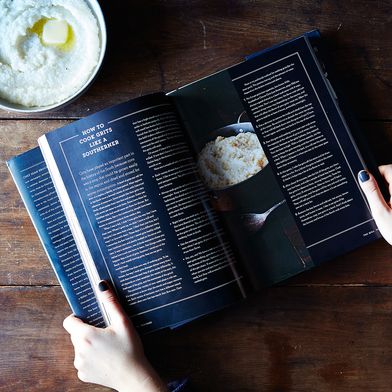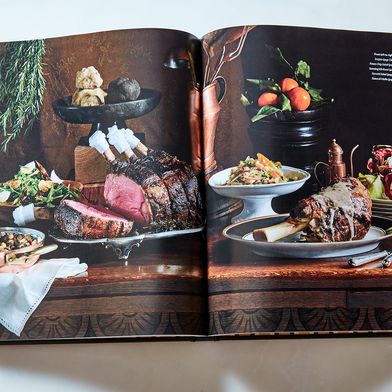When Madame Caramel, a 39-year-old professional dominatrix living in London, first picked up my Skype call, she appeared momentarily distracted. "Sorry, when my Skype is on, all my slaves start messaging me," she said. Her hair was wrapped elegantly behind her head, and her smile, broad and warm, radiated as I asked her what female supremacy meant to her.
"Patriarchy has to end. For us to survive, women have to lead," she said. "The way men have done it for over these years... it's not correct. If the women lead the way, there's a much bigger chance there's not going to be any wars, any problems. Men think with their cocks. They're easily manipulated."
Put more simply, female supremacy is the belief that societies should be women-run, and that men, being inferior, should defer to women always. This ideology isn't all that new, though it is extreme: In the 60s and 70s, radical feminist theorists such as Andrea Dworkin, Monique Wittig, and Mary Daly argued for societies in which women ruled, though most of these imagined utopias were separatist in nature. Most infamously, Valerie Solanas argued in The SCUM Manifesto that contemporary society was totally irrelevant to women, and thus "civic-minded, responsible, thrill-seeking" women had to "overthrow the government, eliminate the money system, institute complete automation and destroy the male sex." (She later told the Village Voice that the group she envisioned in the text—the Society for Cutting Up Men, the eponymous SCUM—was "just a literary device.")
Read more: No Man's Land: How to Build a Feminist Utopia
"The male is an incomplete female, a walking abortion, aborted at the gene stage," Solanas wrote in the introduction to the SCUM Manifesto. "To be male is to be deficient, emotionally limited; maleness is a deficiency disease, and males are emotional cripples.

Madame Caramel
Though Madame Caramel shares a longing for a matriarchal society and keen awareness of Man's mistakes, she practices female supremacy on a micro level—in her personal relationships. For her, female supremacy exists between two people who agree on a set of rules, all centered on this one: the woman makes the calls. She's in a loving dominant-submissive relationship with her partner of four years, who proposed to her last year in Luxembourg Garden. Her ring is huge.
"The way we decided that this relationship could work for me was if I were in charge of everything," she said. "It's so much better when you take the responsibilities out of the man. My partner is a highly intelligent man—he's there for me for whatever I need—but the control is all mine. I buy the furniture I want. I buy the car I want. I travel to where I want. He just has to follow and enjoy the ride. He loves it."
Female supremacy is not for everyone, Madame Caramel says, even though it's the best way to live and play and fuck. The underlying idea—that women are supreme—structures her relationship with her partner and with her slaves, of which she has two types: paying and lifestyle. The former pays for hour-long or overnight session, while the latter offers something a bit more intimate. Her lifestyle submissives—"and this is when my female supremacy takes over"—pay her money so she can maintain her extravagant lifestyle, yet the relationship is not transactional; she says she feels a deep love for them. They're the ones who treat her like a goddess, the ones she trains to give her oral properly, the ones who recognize her pleasure is paramount.
Sadie Synn, a lifestyle and professional dominatrix who has been in the BDSM community for four-and-a-half years, makes a similar distinction between lifestyle and more professional, paid client relationships. "There will be lifestyle relationships that will be female supremacy relationships, where the man is a slave," she said. "I've known individuals in relationships where they give their pay checks to their wife: She's their domme, they don't own anything, they do a lot of chores around the house. The woman makes all the decisions. When you get into the dominatrix side, that's where it becomes much more a performance. Where lifestyle dommes really take it much more to heart, on the pro-domme side it can be much more of a show."

Sadie Synn
Synn is a trans woman, which gives her a unique perspective on the female supremacist ideology. "Ironically, I started off in the community as a male submissive, or a male slave," she recalled. "A lot of that had to do with my own personal transition; I was really attracted to femdom."
Synn started taking hormones in 2014. As estrogen levels increased in her body, she says, she noticed how much more she was able to feel. She started to believe that testosterone had "emotionally muted" her. This sense of heightened emotional intelligence, as well as her increased involvement in the BDSM community, cemented her female supremacist views, which she says land on the more accepting side of the spectrum.
Intuitively, the ideology makes sense to Synn, who considers herself an intersectional feminist. "For me, it's about recognizing the value of feeling more emotional and how that can lead to rational thought. If you look around, what percentage of crimes are done by men, what percentage are done by women?" she said. "It's obvious that men still act like animals because of testosterone. A lot of our political figures do stupid shit. You typically see women act better. They run things better. I'm just going off of those observations. Women do things better."
Outside of the BDSM community, the idea of female supremacy is not widely propagated, not even among radical feminists, as one might reflexively assume. The philosophy is intimately informed by the slave-master dynamic and dominatrix culture, teetering between fetish and worldview, if you can even disentangle the two. Complicating matters, the discussions surrounding female supremacy exist almost exclusively on the internet and private spaces; there is no "voice" for the movement, which can make its aims difficult to pinpoint. The Facebook group "The New World Order of Female Supremacy" has just 110 members and is somewhat puzzling—both admins are men. The description of the group reads as follows:
Our movement supports the idea of world peace through gynarchy, government by women.
On our groups, all women are presumed to be strong women. They are addressed as Mistress. Sissies are presumed to be servants of the female members. Men are presumed to be servants of female members and sissies. We welcome good quality images of women, and anything else that will not upset Facebook terms of service.
To what extent would these two men—and the group's other 108 members—advocate for "gynarchy" and government by women in real life?
According to Sue Storm, a fetish educator and host of the podcast In Bed with Dr. Sue, who worked as a professional dominatrix for forty years, most online female supremacy advocacy is "a façade." "It's all to make the money," she told Broadly. "Out of all the women that say they're female supremacists, only two to three percent are actual female supremacists."
It's obvious that men still act like animals because of testosterone.
She used to identify as a female supremacist, she added, but has grown disgusted by the bickering and bullying among young female dommes, which she feels has made the true realization of female supremacy impossible. "The whole femdom sisterhood is garbage. We are not evolved enough," she said, noting that the rise of financial domination, or "findom," has led to younger domes adopting female supremacist personas in order to attract subs willing to lavish them with gifts and money. "Most women who get into this business are doing it for quick bucks, so there's a lot of infighting. It's rare to see two women who aren't fighting. How is that supreme behavior?"
In July 2013, a 30-year-old polyamorous dominant who goes by Domina Jen wrote a blog post entitled "Why I No Longer Believe in Female Supremacy," in which she expressed similar reservations about the nebulous movement. While she still believes that "females are biologically and physically superior to males," she wrote, she is uncomfortable making essentializing generalizations.
"I don't want respect just because I'm a woman," she wrote. "That feels fake and empty. I want to be respected because of my actions, because of who I am. There are countless women who are weak-willed, weak-minded, self-serving, and cruel. I've known too many women who do not deserve any kind of respect. And the idea of those women being in charge of anything or anyone is fucking terrifying."
Do I think that women need to rise to power? 100 percent. Do I think we're supreme above all others? Absolutely not.
Dr. Sue, too, is decidedly anti-female supremacy, but needs for men to get it together. "Do I think that there's a hierarchy and that men have screwed everything up? Hell yes. White men have been the bane of everybody's existence. Do I think that women need to rise to power? 100 percent. Do I think we're supreme above all others? Absolutely not. There is no better race, there is no better gender, there is no better anything. We are all the same. And we need to all care for each other that way."
And yet, there is something alluring about a consensual, loving relationship that is structured by the model of female dominance. Every Friday, Madame Caramel and her fiancé celebrate what they call "FemDom Friday." She sleeps in, while he gets a bit of work done and then begins the preparations: setting out the outfit she chose the night before, cooking, drawing a bath, pleasuring her. Her fiancé devotes the entire day to her needs and wants. It sounds idyllic.
Madame Caramel plans on retiring in April, after 14 years as a professional dominatrix, so she can spend more time with her soon-to-be husband. "Although I have other lifestyle slaves and will continue to give them attention, my focus right now is on my partner," she said. "Because I want to train him even better to the best of my abilities. There are some things that he cannot do properly yet—like baking. And I love cakes! He cheats. He buys that Betty Crocker. No, no, no, no. I want it baked from scratch."



























 Because this is the world we live in now, Ashley Glawe
Because this is the world we live in now, Ashley Glawe  Thanks to Jarod and Zootghost, who agree if you can't own a pet without getting it stuck in your ear and having to go to the emergency room, maybe you shouldn't own a pet.
Thanks to Jarod and Zootghost, who agree if you can't own a pet without getting it stuck in your ear and having to go to the emergency room, maybe you shouldn't own a pet.






